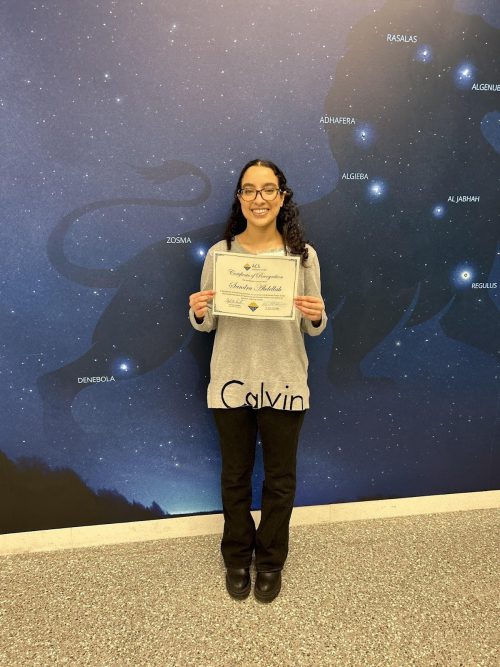Senior Sandra Abdellah displays a Certificate of Recognition from the American Chemical Society.
Sandra Abdellah|Courtesy
Senior Sandra Abdellah is hoping to publish research on an affordable test for the pharmaceutical drug Amisulpride.
What began as a class assignment for senior Chemistry major Sandra Abdellah evolved into an award-winning method, soon to be published in a scientific journal. Abdellah’s method adapts Paper Analytical Devices, or PADs, as a cheaper alternative to testing drugs than traditional chemistry equipment.
“I wanted to see, could I use PADs to create a method that is just as competitively good at quantifying this drug as these big, heavy, expensive machines?” Abdellah said.
These PADs are being adapted by Abdellah to test for the drug Amisulpride, which has many uses. Amisulpride is used as an antipsychotic for schizophrenia as well as an aid for nausea and upset stomachs. The difference in dosage level changes the purpose of the drug, which is a leading reason that higher doses of the drug have not been approved by the FDA.
“The testing methods that we have right now to quantify this drug are just inadequate,” Abdellah said. She explained that the process to test levels of Amisulpride is complicated and inaccessible due to the heavy machines and prolonged procedures required that wastes solution.
For example, a traditional way to test a level of concentration is to use a titration. A titration process takes a long time and involves slowly increasing a sample in a testing beaker until a reagent reacts with a color indicator. Abdellah’s PADs take this basis but instead apply a fractional amount of solution to a PAD and dry it. Adding a small portion of the sample creates a more vibrant color reaction that can be much more easily identified using the color spectrum. These samples can then be analyzed by an app to show just how much amisulpride occurs in the sample.
Abdellah’s PADs have important pharmaceutical benefits, and they are also an opportunity for students to learn and experiment with chemistry. Abdellah’s own passion for chemistry started in school, when she was able to interact and work freely with labs. Sharing this opportunity is an important purpose to her.
“That was my first time just actually feeling the independence of creating something,” Abdellah said, in reference to her work as a chemistry work-study. As a teaching assistant in the Fall 2023 semester, Abdellah was able to switch some of the VWU chemistry labs to paper labs.
These new labs are also part of her research to help students gain a deeper understanding of chemistry and have received an award from the National Science Foundation’s Division of Undergraduate Education for Improving Undergraduate STEM Education. Additionally, the use of paper labs on campus help to further her research and demonstrate the efficiency of PADs.
Professor John Rudel, professor of Art, director of Undergraduate Research and Curator of Exhibitions for the Neil Britton Art Gallery, is familiar with Abdellah’s research. “She is actively advancing her field and developing new solutions to challenges she recognizes,” Rudel said. Rudel has assisted in the publication of Abdellah’s work, such as helping her present at the Fall Academic Symposium and the Old Dominion University Poster Fair hosted by the American Chemical Society. Both of these opportunities helped Abdellah gain insight and ideas to further refine and test her method.
As a mentor on the project, Dr. Maury Howards, professor of Chemistry and director of Nursing and Allied Health, is supportive of Abdellah’s work. “She’s come up with some pretty neat approaches to make it work more efficiently [and] more effectively,” Howard said.
“Overall, [I’m] pushing towards publications as fast as possible,” Abdellah said. Her research also has benefits for underprivileged countries that may not have the expensive, bulky machines needed to test drugs properly. Abdellah explained how using PADs could greatly increase standards of living by creating an ease of access and distribution in all countries.
As for next steps, Abdellah is working to submit her research to the American Academy of Forensic Science’s Journal of Forensic Science, so that it can be shared with the wider chemistry community and eventually patented.
Even so, Abdellah’s invention has already broken new ground on campus and enthused faculty.
“I’m always impressed with students’ approaches; they always come up with stuff that I would not have thought of,” Howard said.
“It’s a privilege to work with students in general,” Rudel said. “But it’s truly special to get to work with individuals, like Sandra Abdellah, who are beacons of excellence and who serve to remind us all of the potential for people to do great things.”
Abdellah is a prime example of the benefits and opportunities that can open to students who engage in undergraduate research.
By Gabrielle Barnett
gabarnett@vwu.edu

